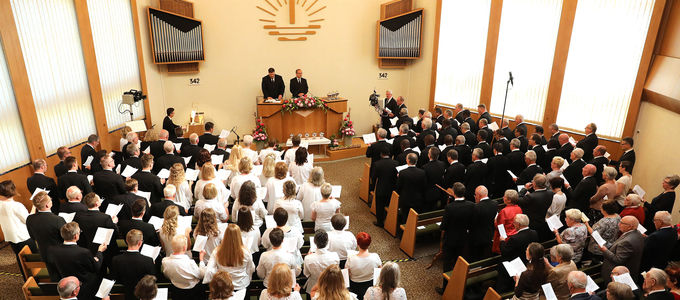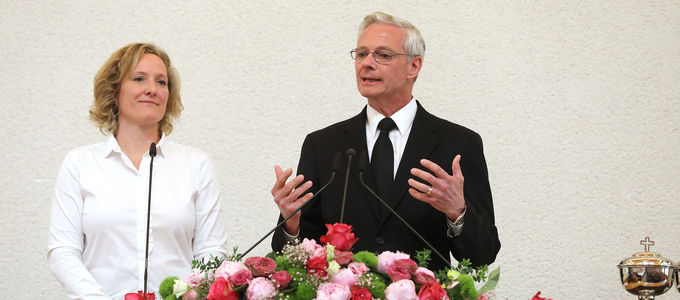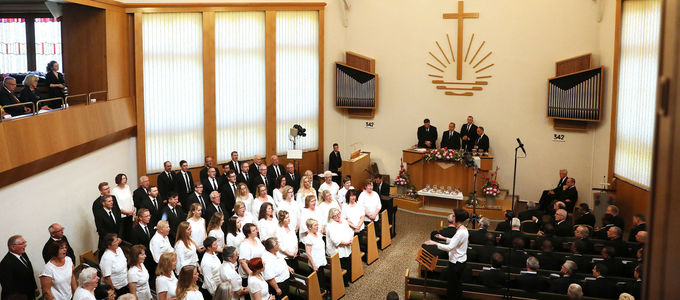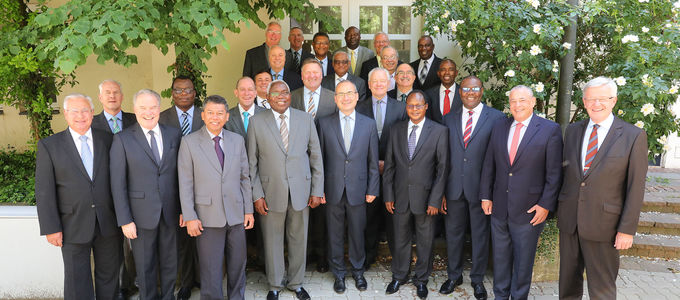
Pentecost 2019 will enter New Apostolic history as a feast of internationality. Hardly ever before have so many impulses of such international significance been aired. Here are some of them to re-read.
The International Youth Convention did the leading ministers of the Church good. This was the feeling that the participants of the Pentecost service had because Chief Apostle Jean-Luc Schneider, who conducted the service in our congregation in Goslar (Germany), specifically mentioned the IYC. In the days before, the many IYC experiences kept coming up in the circle of the District Apostles.
Message No. 1: Participate!
In his Pentecost sermon the Chief Apostle referred to the IYC as an engine of faith. Such major events are necessary because they create new joy, he said, whereby God does not look at the numbers. “The Holy Spirit is also active in small congregations!” So his question as to what is going to happen after this mega-event in the congregations was by no means meant rhetorically: “What are the youth going to do with the experiences they had in Düsseldorf once they are back in their congregations? They will certainly bring back new ideas, new thoughts.” Can the congregations handle them? The Chief Apostle’s recommendation: “Go along with it!”
Message No. 2: No one can stop the Holy Spirit!
The Pentecost service had its very own dramatic thrust. Chief Apostle Schneider called on three Apostles to assist who have to deal with special circumstances in the countries they work in.
- District Apostle Helper David Devaraj reported from India. There is a non-Christian religious majority. Only two per cent of the population on the sub-continent is Christian. The conditions regarding the proclamation of the gospel are difficult. There are many different languages, conditions, and hopes, he said. But God always grants new joy to the Christian congregations through the Holy Spirit and gives them the courage to continue..
- District Apostle Helper Kububa Soko, the designated District Apostle for the Church in Zambia, Malawi, and Zimbabwe, spoke about the many refugee camps in some of the African countries. Millions of people have found shelter there after having fled their villages because of war, terror, or physical violence. Having worked for the Office of the United Nations High Commissioner for Refugees he knows many of the stories told by traumatised people. They are stories full of fear, depression, and horror. Yet, divine services are held in the camps, and the Holy Spirit cares for the believers.
- District Apostle Helper John Fendt addressed the situation in Venezuela. The country’s economic situation has deteriorated to the extreme. Only a few years ago, Venezuela had the highest standard of living in South America. Today the salary that a person earns in a fairly good job is just enough to buy two litres of milk and six eggs a day. A bizarre comparison that shows how hard the situation has become for the people. But the brothers and sisters hold on to their faith, celebrate divine services, and glorify God.
Message No. 3: You are our joy!
Chief Apostle Jean-Luc Schneider’s sermon was very emotional when he turned to the congregations to thank them. There is a tremendous amount of joy and strength that emanates from the 60,000 congregations around the world, he said. Through the power of the Holy Spirit they are connected with one another. The Chief Apostle thanked everyone for all the work that is being done in the congregations, for the members’ unshakeable faith, for their hope, and for their belief in Jesus which they continue to share. “I would like to give you a special message on this Pentecost feast,” the Chief Apostle said. He cited words from Apostle Paul: “We thank God for the joy which we are able to experience through you. You are our joy!” On behalf of the Apostles from around the world he wanted to pass this gratitude on, he said.
Message No. 4: The all-clear for formal assignments
In addition to the many tasks for the ministers of the Church, there are also services and functions in the congregations that are not bound to a ministry. They are of a pastoral nature or serve teaching purposes. Such functions have long been the focus of discussions within the context of the changes to our New Apostolic concept of ministry: which functions are we talking about, who carries them out, how will they be formally conferred? The District Apostle Meeting in Goslar adopted a decision that will apply globally: from now on, sisters and brothers who are active as principal teachers in pre-Sunday School, Sunday School, religious and confirmation instruction will be publicly assigned to their function—either in front of the congregation or in the circle of the children. The assignment is valid until the mandate ends. Thereafter they are also publicly released from their responsibility. The same applies to youth leaders who will be active on a longer-term basis. The helpers who assist them will work without being officially assigned. This will take effect on 1 September 2019.
Message No. 5: Changes in the concept of ministry come into effect
The effective date presented in April has arrived: from Pentecost 2019 onwards, the new regulations concerning our concept of ministry apply. The ministries of Evangelist, Shepherd, District Evangelist, and District Elder will no longer be occupied as of Pentecost 2019.
The reason, from now on, a distinction will be made between ministerial authority and leadership function. The three ministerial levels include the Deacon ministry, the priestly ministry, and the Apostle ministry. The five leadership functions include the congregational rector, the district rector, the Apostle, the District Apostle, and the Chief Apostle.
From now on, an ordination will take place when a ministry of the Church is to be conferred. Leadership functions will be conferred through prayer and the laying-on of hands. Helpers who support the leading ministers will be assigned from now on: for example, Chief Apostle Helper, District Apostle Helper, Bishops, as well as delegates of congregational and district rectors.


































